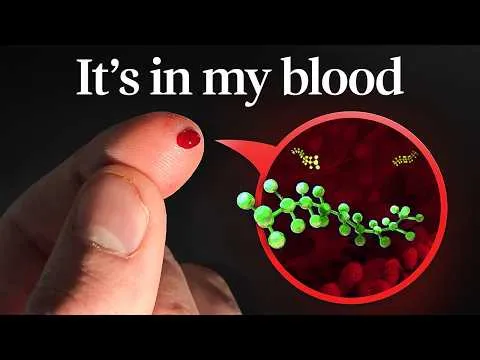Habe diese Veritasium-Doku über "Ewigkeits-Chemikalien" (PFAS) gesehen.
PFAS steht für "Per- and Polyfluoroalkyl Substances" und umfasst eine ganze Reihe von langkettigen Chemikalien, die künstlich aus Kohlenstoff- und Fluor-Atomen gebildet werden. Einige dieser Substanzen sind zum Beispiel PFOA, PFPeA, PFHA, PFHxS, PFBA, PFBS, PFOS etc.
In der Regel sind sie sehr robust, kaum abbaubar und werden deswegen "Forever"-Chemikalien genannt.
In der Industrie aber auch bei vielen Consumer-Produkten kommen sie wegen ihrer antihaft und wasserabweisenden Eigenschaften zum Einsatz und sind allgegenwärtig.
Jetzt haltet euch fest, PFAS kommt zum Beispiel in der Küche bei beschichteten Pfannen, bei Lebensmittel-Verpackungen, sogar in der Kleidung, in Schuh-Imprägniersprays und auch in Make-up-Produkten (zum Beispiel in Lippenstiften) vor, um diese besser haltbar zu machen, um nur einige Beispiele zu nennen.
Mittlerweile wurde auch die Nahrungskette kontaminiert. Selbst wenn man PFAS-Produkte vermeidet, was fast unmöglich ist, isst oder trinkt man es unbewusst mit.
Bei einigen PFAS wie PFOA (C8, Perfluorooctanoic acid) weiß man, dass es die Wahrscheinlichkeit für Krebs und viele andere Krankheiten erhöht. Andere PFAS-Chemikalien sind weniger gut erforscht, haben aber vermutlich eine ähnliche gesundheitsschädigende Wirkung, wobei es wie immer auf die Menge ankommt.
Es gibt aber auch ein paar gute Nachrichten, Teflon, das in antihaft-beschichteten Pfannen verwendet wird, könnte weniger gesundheitsschädlich sein als gedacht, da es vom Körper nicht gebunden werden kann und ausgeschieden wird. Das Problem ist aber der Herstellungsprozess von Teflon, bei dem andere PFAS-Chemikalien erzeugt werden und diese sind dann über Jahrzehnte in die Umwelt gelangt.
Die Industrie (zumindest in den USA und in der EU) bemüht sich jetzt aber anscheinend, an PFAS-Capturing zu arbeiten (wofür es bis jetzt keine Verpflichtung gibt), das heißt bei der Erzeugung von Teflon, die anderen PFAS-Chemikalien, die beim Herstellungsprozess entstehen, zu filtern.
Und dann gibt es noch eine pragmatisches Argument, trotz Umweltverschmutzung und Kontamination der Nahrungskette mit PFAS haben die meisten Menschen eine längere Lebenserwartung als fürher, als die Industrie noch kein PFAS hergestellt hat. PFAS könnte mit seinen nützlichen Eigenschaften für die Industrie eine "netto positive" Erfindung sein.
Über die Zeit könnte PFAS aber ein Problem werden, wenn die Konzentration und die PFAS-Kontamination immer weiter ansteigt.
Was sagt ihr dazu? Hattet ihr PFAS bereits auf dem Radar? Versucht ihr es zu vermeiden und wie?
Veritasium: How One Company Secretly Poisoned The Planet
Video credit: Veritasium
English
I watched this Veritasium documentary about “forever chemicals” (PFAS).
PFAS stands for “per- and polyfluoroalkyl substances” and encompasses a whole range of long-chain chemicals that are artificially formed from carbon and fluorine atoms. Some of these substances are, for example, PFOA, PFPeA, PFHA, PFHxS, PFBA, PFBS, PFOS, etc.
They are usually very robust, hardly degradable, and are therefore called “forever” chemicals.
They are used in industry and in many consumer products because of their non-stick and water-repellent properties and are ubiquitous.
Now brace yourself, PFAS are found almost everywhere, for example, in coated pans in the kitchen, in food packaging, even in clothing, in shoe waterproofing sprays, and also in makeup products (for example, in lipsticks) to make them more durable, to name just a few examples.
The food chain has now also been contaminated with PFAS. Even if you avoid PFAS products, which is almost impossible, you unknowingly eat or drink them.
Some PFAS, such as PFOA (C8, perfluorooctanoic acid), are known to increase the likelihood of cancer and many other diseases. Other PFAS chemicals are less well researched but are thought to have similar harmful health effects, although, as always, it depends on the amount.
However, there is also some good news: Teflon, which is used in non-stick pans, may be less harmful to health than previously thought, as it cannot be bound by the body and is excreted. The problem, however, is the manufacturing process of Teflon, which produces other PFAS chemicals that have been released into the environment over decades.
However, the industry (at least in the US and the EU) now appears to be working on PFAS capturing (for which there is currently no obligation), which means filtering out the other PFAS chemicals produced during the manufacturing process when producing Teflon.
And then there is a pragmatic argument: despite environmental pollution and contamination of our food chain with PFAS, most people have a longer life expectancy than before, when industry did not yet produce PFAS. With its useful properties for industry and consumers, PFAS could be a “net positive” invention.
Over time, however, PFAS could become a problem if concentrations and PFAS contamination continue to rise.
What do you think? Were you already aware of PFAS? Do you try to avoid it, and if so, how?
